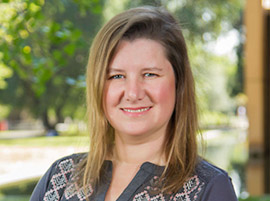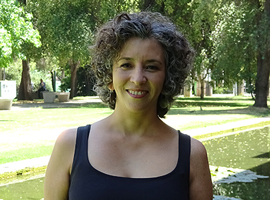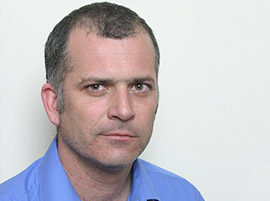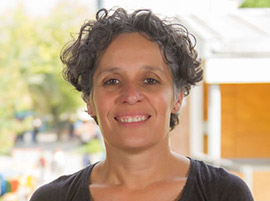
Jorge Manzi Astudillo
– Doctor en Psicología, University Of California, Estados Unidos.
– Magíster en Psicología, University Of California, Estados Unidos.
– Psicólogo y Licenciado en Psicología, P. Universidad Católica de Chile.
Jorge Manzi es psicólogo de la Universidad Católica y doctor en psicología de la Universidad de California en Los Angeles. Sus áreas de especialidad incluyen la psicología social y la psicometría. En la psicología social se ha concentrado principalmente en la comprensión de fenómenos de la esfera política. En este campo ha investigado diversos temas tales como el desarrollo de las ideas políticas en niños y jóvenes; la memoria colectiva de eventos políticos; el rol de las emociones en los procesos de reconciliación social y la identificación de jóvenes universitarios con grupos y referentes políticos. Actualmente participa en un proyecto de investigación que con una metodología de panel está estudiando aspectos de la cultura política de tres generaciones de chilenos.
En el campo de la psicometría ha realizado principalmente aportes en el campo de la medición educacional. Participó en el proyecto de investigación que contribuyó a la reformulación de las pruebas de admisión a las universidades (PSU) y ha dirigido dos proyectos de investigación y desarrollo a nivel nacional relacionados con la evaluación de profesores: el programa de Asignación de Excelencia Pedagógica y la evaluación del desempeño profesional de los profesores que trabajan en escuelas y liceos de dependencia municipal. A través del Centro de Medición MIDE UC (que dirige), participa también en otros proyectos que están contribuyendo al desarrollo y evaluación de instrumentos de medición en el campo educacional y organizacional.
Ramos impartidos
- 1991 – Primer Semestre Pregrado, Higiene Mental y Psicopatologia, Catedra, PSB310/1
- 1991 – Primer Semestre Pregrado, Fundamentos Psicologicos del Comportamiento Humano, Catedra, PSB119/1
- 1991 – Segundo Semestre Pregrado, Psicologia General, Catedra, PSB109/1
- 1991 – Segundo Semestre Pregrado, Metodologia IV, Catedra, PSB148/1
- 1992 – Primer Semestre Pregrado, Metodologia III, Catedra, PSB147/1
- 1992 – Segundo Semestre Pregrado, Metodologia IV, Catedra, PSB148/1
- 1993 – Segundo Semestre Pregrado, Psicologia Social, Lectivo, SOL112/1
- 1993 – Segundo Semestre Pregrado, Seminario de Titulo I, Tesis, Proyecto, Seminario, PSI126/2
- 1994 – Primer Semestre Pregrado, Metodologia IV, Catedra, PSB148/1
- 1994 – Primer Semestre Pregrado, Metodologia III, Catedra, PSB147/1
- 1994 – Primer Semestre Pregrado, Problemas Psicosociales I, Catedra, PSB409/1
- 1994 – Primer Semestre Pregrado, Seminario de Titulo II, Tesis, Proyecto, Seminario, PSI127/2
- 1994 – Primer Semestre Pregrado, Psicologia Social II, Lectivo, PSB142/1
- 1995 – Primer Semestre Pregrado, Psicologia General, Catedra, PSB109B/1
- 1995 – Primer Semestre Pregrado, Psicologia General, Catedra, PSB400/1
- 1995 – Primer Semestre Pregrado, Psicologia General, Catedra, PSB400/2
- 1995 – Primer Semestre Pregrado, Psicologia General, Catedra, PSB400/3
- 1995 – Primer Semestre Pregrado, Investigacion en Psicologia, Catedra, PSL413/2
- 1995 – Primer Semestre Post-Grado, Metodologia, Catedra, PSM404/1
- 1995 – Segundo Semestre Pregrado, Psicologia Social, Catedra, PSB405/2
- 1995 – Segundo Semestre Pregrado, Metodos de Analisis de Datos, Catedra, PSB410/2
- 1996 – Primer Semestre Pregrado, Investigacion en Psicologia, Catedra, PSL413/2
- 1996 – Primer Semestre Post-Grado, Metodologia, Catedra, PSM404/1
- 1996 – Primer Semestre Post-Grado, Analisis Psicosocial Interdependencia Individuo-Sociedad, Catedra, PSM402/1
- 1996 – Segundo Semestre Pregrado, Psicologia Social, Catedra, PSB405/2
- 1996 – Segundo Semestre Post-Grado, Salud Mental, Mujer y Trabajo, Catedra, PSM308/1
- 1996 – Segundo Semestre Post-Grado, Tesis II, Tesis, Proyecto, Seminario, PSM407/1
- 1997 – Primer Semestre Pregrado, Investigacion en Psicologia, Catedra, PSL413/2
- 1997 – Segundo Semestre Pregrado, Psicologia Social, Catedra, PSB405/2
- 1997 – Segundo Semestre Post-Grado, Metodologia Cuantitativa Avanzada, Catedra, PSM404B/1
- 1997 – Segundo Semestre Post-Grado, Analisis Psicosocial Interdependencia Individuo-Sociedad, Catedra, PSM402/1
- 1998 – Primer Semestre Pregrado, Investigacion en Psicologia, Catedra, PSL413/2
- 1998 – Primer Semestre Post-Grado, Estudio Dirigido, Catedra, PSM432/1
- 1998 – Segundo Semestre Pregrado, Organizacion y Comportamiento en la Empresa, Catedra, ICS2702/1
- 1998 – Segundo Semestre Post-Grado, Metodologia Cuantitativa Avanzada, Catedra, PSM404B/1
- 1998 – Segundo Semestre Post-Grado, Analisis Psicosocial Interdependencia Individuo-Sociedad, Catedra, PSM402A/1
- 1998 – Segundo Semestre Pregrado, Psicologia Social, Catedra, PSB405/1
- 1999 – Primer Semestre Pregrado, Organizacion y Comportamiento en la Empresa, Catedra, ICS2702/1
- 1999 – Primer Semestre Pregrado, Investigacion en Psicologia, Catedra, PSL413/2
- 1999 – Primer Semestre Post-Grado, Desarrollos Actuales en Psicologia Social, Catedra, PSD506/1
- 1999 – Primer Semestre Post-Grado, Analisis Psicosocial Interdependencia Individuo-Sociedad, Catedra, PSM402A/1
- 1999 – Primer Semestre Post-Grado, Metodologia Cuantitativa Avanzada, Catedra, PSM404B/1
- 1999 – Primer Semestre Post-Grado, Metodologia Cuantitativa Avanzada I, Catedra, PSD509/1
- 1999 – Segundo Semestre Pregrado, Organizacion y Comportamiento en la Empresa, Catedra, ICS2702/1
- 2000 – Primer Semestre Post-Grado, Desarrollos Actuales en Psicologia Social, Catedra, PSD506/1
- 2000 – Primer Semestre Pregrado, Investigacion en Psicologia, Catedra, PSL413/2
- 2000 – Primer Semestre Pregrado, Organizacion y Comportamiento en la Empresa, Catedra, ICS2702/1
- 2000 – Primer Semestre Post-Grado, Metodologia Cuantitativa Avanzada I, Catedra, PSD509/1
- 2000 – Primer Semestre Post-Grado, Metodologia Cuantitativa Avanzada, Catedra, PSM404B/1
- 2000 – Segundo Semestre Post-Grado, Metodologia Cuantitativa Avanzada II, Catedra, PSD510/1
- 2000 – Segundo Semestre Pregrado, Psicologia Social, Catedra, PSB405/2
- 2000 – Segundo Semestre Pregrado, Organizacion y Comportamiento en la Empresa, Catedra, ICS2702/1
- 2000 – Segundo Semestre Post-Grado, Construccion de Instrumentos de Medicion en Psicologia y Educacion, Catedra, PSM447/1
- 2001 – Primer Semestre Pregrado, Organizacion y Comportamiento en la Empresa, Catedra, ICS2702/1
- 2001 – Primer Semestre Pregrado, Investigacion en Psicologia, Catedra, PSL413/2
- 2001 – Primer Semestre Post-Grado, Desarrollos Actuales en Psicologia Social, Catedra, PSD506/1
- 2001 – Primer Semestre Post-Grado, Metodologia Cuantitativa Avanzada I, Catedra, PSD509/1
- 2001 – Primer Semestre Post-Grado, Practica en Investigacion I, Practica, PSD540/1
- 2001 – Segundo Semestre Pregrado, Organizacion y Comportamiento en la Empresa, Catedra, ICS2702/1
- 2001 – Segundo Semestre Pregrado, Psicologia Social, Catedra, PSB405/2
- 2001 – Segundo Semestre Post-Grado, Metodologia Cuantitativa Avanzada II, Catedra, PSD510/1
- 2001 – Segundo Semestre Post-Grado, Construccion de Instrumentos de Medicion en Psicologia y Educacion, Catedra, PSM447/1
- 2002 – Primer Semestre Post-Grado, Desarrollos Actuales en Psicologia Social, Catedra, PSD506/1
- 2002 – Primer Semestre Post-Grado, Tesis Doctoral I, Tesis, Proyecto, Seminario, PSD561/1
- 2002 – Primer Semestre Post-Grado, Proyecto de Tesis Doctoral, Tesis, Proyecto, Seminario, PSD560/1
- 2002 – Primer Semestre Post-Grado, Metodologia Cuantitativa Avanzada I, Catedra, PSD509/1
- 2002 – Segundo Semestre Pregrado, Organizacion y Comportamiento en la Empresa, Catedra, ICS2702/1
- 2002 – Segundo Semestre Pregrado, Psicologia Social, Catedra, PSB405/2
- 2002 – Segundo Semestre Post-Grado, Seminario de Profundizacion Metodologico I, Tesis, Proyecto, Seminario, PSD567/1
- 2002 – Segundo Semestre Post-Grado, Seminario de Investigacion Doctoral II, Tesis, Proyecto, Seminario, PSD566/1
- 2002 – Segundo Semestre Post-Grado, Tesis Doctoral IV, Tesis, Proyecto, Seminario, PSD564/1
- 2002 – Segundo Semestre Post-Grado, Tesis Doctoral III, Tesis, Proyecto, Seminario, PSD563/1
- 2002 – Segundo Semestre Post-Grado, Tesis Doctoral II, Tesis, Proyecto, Seminario, PSD562/1
- 2002 – Segundo Semestre Post-Grado, Metodologia Cuantitativa Avanzada II, Catedra, PSD510/1
- 2002 – Segundo Semestre Pregrado, Investigacion en Psicologia, Catedra, PSL413/1
- 2003 – Primer Semestre Post-Grado, Seminario de Investigacion Doctoral I, Tesis, Proyecto, Seminario, PSD565/1
- 2003 – Primer Semestre Post-Grado, Seminario de Profundizacion Metodologico I, Tesis, Proyecto, Seminario, PSD567/1
- 2003 – Primer Semestre Post-Grado, Metodologia Cuantitativa Avanzada I, Catedra, PSD509/1
- 2003 – Primer Semestre Post-Grado, Desarrollos Actuales en Psicologia Social, Catedra, PSD506/1
- 2003 – Primer Semestre Pregrado, Organizacion y Comportamiento en la Empresa, Catedra, ICS2702/1
- 2003 – Primer Semestre Post-Grado, Tesis Doctoral IV, Tesis, Proyecto, Seminario, PSD564/1
- 2003 – Primer Semestre Post-Grado, Seminario de Profundizacion Metodologico II, Tesis, Proyecto, Seminario, PSD568/1
- 2003 – Segundo Semestre Pregrado, Organizacion y Comportamiento en la Empresa, Catedra, ICS2702/1
- 2003 – Segundo Semestre Pregrado, Psicologia Social, Catedra, PSB405/1
- 2003 – Segundo Semestre Pregrado, Investigacion en Psicologia, Catedra, PSL413/1
- 2003 – Segundo Semestre Post-Grado, Metodologia Cuantitativa Avanzada II, Catedra, PSD510/1
- 2003 – Segundo Semestre Post-Grado, Tesis Doctoral II, Tesis, Proyecto, Seminario, PSD562/1
- 2003 – Segundo Semestre Post-Grado, Seminario de Profundizacion Metodologico I, Tesis, Proyecto, Seminario, PSD567/1
- 2004 – Primer Semestre Post-Grado, Metodologia Cuantitativa Avanzada I, Catedra, PSD509/1
- 2004 – Primer Semestre Post-Grado, Desarrollos Actuales en Psicologia Social, Catedra, PSD506/1
- 2004 – Primer Semestre Pregrado, Organizacion y Comportamiento en la Empresa, Catedra, ICS2702/1
- 2004 – Primer Semestre Post-Grado, Construccion de Instrumentos de Medicion en Psicologia y Educacion, Catedra, PSM447/1
- 2004 – Primer Semestre Post-Grado, Tesis Doctoral IV, Tesis, Proyecto, Seminario, PSD564/1
- 2004 – Segundo Semestre Pregrado, Organizacion y Comportamiento en la Empresa, Catedra, ICS2702/1
- 2004 – Segundo Semestre Pregrado, Psicologia Social, Catedra, PSB405/3
- 2004 – Segundo Semestre Pregrado, Investigacion en Psicologia, Catedra, PSL413/1
- 2004 – Segundo Semestre Post-Grado, Metodologia Cuantitativa Avanzada I, Catedra, PSD509/1
- 2004 – Segundo Semestre Post-Grado, Metodologia Cuantitativa Avanzada II, Catedra, PSD510/1
- 2005 – Primer Semestre Post-Grado, Construccion de Instrumentos de Medicion en Psicologia y Educacion, Catedra, PSM447/1
- 2005 – Primer Semestre Post-Grado, Metodologia Cuantitativa Avanzada I, Catedra, PSD509/1
- 2005 – Primer Semestre Post-Grado, Desarrollos Actuales en Psicologia Social, Catedra, PSD506/1
- 2005 – Primer Semestre Post-Grado, Practica en Investigacion I, Practica, PSD540/1
- 2005 – Primer Semestre Post-Grado, Tesis II, Tesis, Proyecto, Seminario, PSM407/1
- 2005 – Primer Semestre Post-Grado, Tesis I, Tesis, Proyecto, Seminario, PSM406/1
- 2005 – Segundo Semestre Pregrado, Organizacion y Comportamiento en la Empresa, Catedra, ICS2702/2
- 2005 – Segundo Semestre Pregrado, Psicologia Social, Catedra, PSB405/2
- 2005 – Segundo Semestre Post-Grado, Metodologia Cuantitativa Avanzada I, Catedra, PSD509/1
- 2005 – Segundo Semestre Post-Grado, Practica en Docencia I, Practica, PSD550/1
- 2005 – Segundo Semestre Post-Grado, Proyecto de Tesis Doctoral, Tesis, Proyecto, Seminario, PSD560/1
- 2005 – Segundo Semestre Post-Grado, Seminario de Profundizacion Metodologico II, Tesis, Proyecto, Seminario, PSD568/1
- 2005 – Segundo Semestre Post-Grado, Tesis II, Tesis, Proyecto, Seminario, PSM407/1
- 2006 – Primer Semestre Pregrado, Investigacion en Psicologia, Catedra, PSL413/1
- 2006 – Primer Semestre Post-Grado, Desarrollos Actuales en Psicologia Social, Catedra, PSD506/1
- 2006 – Primer Semestre Post-Grado, Practica en Docencia I, Practica, PSD550/1
- 2006 – Primer Semestre Post-Grado, Construccion de Instrumentos de Medicion en Psicologia y Educacion, Catedra, PSM447/1
- 2006 – Primer Semestre Post-Grado, Tesis Doctoral I, Tesis, Proyecto, Seminario, PSD561/1
- 2006 – Segundo Semestre Pregrado, Organizacion y Comportamiento en la Empresa, Catedra, ICS2702/2
- 2006 – Segundo Semestre Post-Grado, Seminario de Profundizacion Metodologico II, Tesis, Proyecto, Seminario, PSD568/1
- 2006 – Segundo Semestre Post-Grado, Tesis Doctoral II, Tesis, Proyecto, Seminario, PSD562/1
- 2006 – Segundo Semestre Post-Grado, Tesis Doctoral I, Tesis, Proyecto, Seminario, PSD561/1
- 2006 – Segundo Semestre Post-Grado, Proyecto de Tesis Doctoral, Tesis, Proyecto, Seminario, PSD560/1
- 2006 – Segundo Semestre Post-Grado, Estudio Dirigido, Catedra, PSM432/3
- 2007 – Primer Semestre Post-Grado, Desarrollos Actuales en Psicologia Social, Catedra, PSD506/1
- 2007 – Primer Semestre Pregrado, Investigacion en Psicologia, Catedra, PSL413/1
- 2007 – Primer Semestre Pregrado, Organizacion y Comportamiento en la Empresa, Catedra, ICS2702/2
- 2007 – Primer Semestre Post-Grado, Construccion de Instrumentos de Medicion en Psicologia y Educacion, Catedra, PSM447/1
- 2007 – Primer Semestre Post-Grado, Tesis I, Tesis, Proyecto, Seminario, PSM406/1
- 2007 – Segundo Semestre Pregrado, Organizacion y Comportamiento en la Empresa, Catedra, ICS2702/2
- 2007 – Segundo Semestre Pregrado, Psicologia Social, Catedra, PSB405/1
- 2007 – Segundo Semestre Post-Grado, Metodologia Cuantitativa Avanzada II, Catedra, PSD510/1
- 2008 – Primer Semestre Post-Grado, Desarrollos en Psicologia Social, Catedra, PSI4008/1
- 2008 – Primer Semestre Post-Grado, Desarrollos Actuales en Psicologia Social, Catedra, PSD506/1
- 2008 – Primer Semestre Pregrado, Organizacion y Comportamiento en la Empresa, Catedra, ICS2702/2
- 2008 – Primer Semestre Post-Grado, Construccion de Instrumentos de Medicion en Psicologia y Educacion, Catedra, PSM447/1
- 2008 – Primer Semestre Post-Grado, Proyecto de Tesis, Tesis, Proyecto, Seminario, PSM437/1
- 2008 – Primer Semestre Post-Grado, Construccion de Instrumentos de Medicion en Psicologia, Catedra, PSM5021/1
- 2008 – Segundo Semestre Post-Grado, Metodologia Cuantitativa Avanzada II, Catedra, PSD510/1
- 2008 – Segundo Semestre Pregrado, Organizacion y Comportamiento en la Empresa, Catedra, ICS2702/2
- 2008 – Segundo Semestre Pregrado, Psicologia Social, Catedra, PSB405/2
- 2009 – Primer Semestre Post-Grado, Desarrollos en Psicologia Social, Catedra, PSI4008/1
- 2009 – Primer Semestre Post-Grado, Desarrollos Actuales en Psicologia Social, Catedra, PSD506/1
- 2009 – Primer Semestre Pregrado, Organizacion y Comportamiento en la Empresa, Catedra, ICS2702/2
- 2009 – Primer Semestre Post-Grado, Construccion de Instrumentos de Medicion en Psicologia y Educacion, Catedra, PSM447/1
- 2009 – Segundo Semestre Pregrado, Organizacion y Comportamiento en la Empresa, Catedra, ICS2702/2
- 2009 – Segundo Semestre Post-Grado, Metodologia Cuantitativa Avanzada II, Catedra, PSD510/1
- 2009 – Segundo Semestre Pregrado, Psicologia Social, Catedra, PSB405/2
- 2010 – Primer Semestre Post-Grado, Desarrollos en Psicologia Social, Catedra, PSI4008/1
- 2010 – Primer Semestre Post-Grado, Desarrollos Actuales en Psicologia Social, Catedra, PSD506/1
- 2010 – Primer Semestre Pregrado, Organizacion y Comportamiento en la Empresa, Catedra, ICS2702/2
- 2010 – Primer Semestre Post-Grado, Construccion de Instrumentos de Medicion en Psicologia, Catedra, PSM5021/1
- 2010 – Segundo Semestre Pregrado, Organizacion y Comportamiento en la Empresa, Catedra, ICS2702/2
- 2010 – Segundo Semestre Pregrado, Psicología Social, Catedra, PSI1205/1
- 2010 – Segundo Semestre Post-Grado, Metodologia Cuantitativa Avanzada II, Catedra, PSD510/1
- 2011 – Primer Semestre Post-Grado, Desarrollos en Psicologia Social, Catedra, PSI4008/1
- 2011 – Primer Semestre Post-Grado, Desarrollos Actuales en Psicologia Social, Catedra, PSD506/1
- 2011 – Primer Semestre Pregrado, Organizacion y Comportamiento en la Empresa, Catedra, ICS2702/2
- 2011 – Primer Semestre Post-Grado, Construccion de Instrumentos de Medicion en Psicologia y Educacion, Catedra, PSM447/1
- 2011 – Primer Semestre Post-Grado, Construccion de Instrumentos de Medicion en Psicologia, Catedra, PSM5021/1
- 2011 – Segundo Semestre Post-Grado, Metodologia Cuantitativa Avanzada II, Catedra, PSD510/1
- 2011 – Segundo Semestre Pregrado, Taller de Integración III, Laboratorio, PSI2305/4
- 2011 – Segundo Semestre Pregrado, Psicología Social, Catedra, PSI1205/1
- 2011 – Segundo Semestre Pregrado, Organización y Comportamiento en la Empresa, Catedra, ICS2813/2
- 2012 – Primer Semestre Post-Grado, Construccion de Instrumentos de Medicion en Psicologia y Educacion, Catedra, PSM447/1
- 2012 – Primer Semestre Post-Grado, Desarrollos en Psicologia Social, Catedra, PSI4008/1
- 2012 – Primer Semestre Post-Grado, Desarrollos Actuales en Psicologia Social, Catedra, PSD506/1
- 2012 – Primer Semestre Post-Grado, Construccion de Instrumentos de Medicion en Psicologia, Catedra, PSM5021/1
- 2012 – Primer Semestre Pregrado, Organización y Comportamiento en la Empresa, Catedra, ICS2813/2
Cargos
01/01/2003 – 31/12/2005 Director Programa De Postítulo Intervenciones Psicoterapéuticas En Adultos, Escuela De Psicología.
03/03/2010 – 01/07/2011 Coordinador De Ciclo, Escuela De Psicología.
03/03/2010 – 01/07/2011 Integrante Comité Curricular, Escuela De Psicología.
01/01/1999 – 31/12/2005 Jefe Programa De Tratamiento De Adicciones, Escuela De Psicología.
01/01/2004 – 31/12/2004 Supervisión De Alumnos En Práctica, Escuela De Psicología.
01/01/2004 – 31/12/2005 Supervisor Perteneciente Al Equipo De Profesionales , Centro De Salud Mental Centro Médico San Joaquín.
Organización de Actividades
- 01/01/1999 – 31/12/2000 Diploma Prevención Escolar Del Consumo De Drogas Y Alcohol. Dirigido A Coordinadores Regionales, Provinciales Y Comunales De Todo Chile, Ministerio De Educación, Chile.
- “Análisis sobre valoraciones, comprensión y uso del SIMCE por parte de directores escolares de establecimientos subvencionados”, MINEDUC, FONIDE, 1 año (marzo 2013 – marzo 2014), Año de adjudicación: 2012, (investigador responsable).
- “Sistema Integrado de Observación y Análisis del Comportamiento Humano”, FONDEQUIP / Equipamiento Científico y Tecnológico, 14 meses (Octubre 2013, Diciembre 2014), Año de adjudicación: 2013, (co-investigador).
- “Formación de competencias financieras y comerciales en pequeños empresarios y su evaluación experimental”, FONDEF, Investigación y Desarrollo, 3 años (marzo 2011 – marzo 2014), Año de adjudicación: 2010, (co-investigador).
- “¿Qué características de la formación inicial de los docentes se asocian a mayores avances en su aprendizaje de conocimientos disciplinarios?”, MINEDUC, FONIDE, 1 año (Diciembre 2010 – Diciembre 2011), Año de adjudicación: 2010, (Investigador responsable)
- “Prácticas pedagógicas implícitas de los docentes responsables del aprendizaje inicial del lenguaje escrito”, FONDAP, Apoyo a la Investigación en Centros de Excelencia, 3 años (enero 2008 – enero 2011), Año de adjudicación: 2007, (Investigador responsable).
- “Desarrollo de pruebas estandarizadas y de una metodología de valor agregado para evaluar el progreso de los aprendizajes en matemática y lenguaje de estudiantes de segundo ciclo de enseñanza básica (5º a 8º)”, CORFO, Innova, Bienes Públicos, 2 años (Enero 2007 – Enero 2009), Año de adjudicación: 2007, (Investigador responsable).
- “Estudio de validez consecuencial de los sistemas de evaluación de desempeño y excelencia docente”, FONDECYT Regular, 3 años (marzo 2008 – marzo 2011), Año de adjudiación: 2008, (co-investigador).
- “Centro de Estudios, políticas y prácticas en educación”, PBCT, Centros de Investigación en Educación, 4 años (marzo 2008 – marzo 2012), Año de adjudicación: 2008, (co-investigador).
- “Quality of education en latin america and the caribean”, Banco Interamericano del Desarrollo, 1 año, Año de adjudicación: 2007, (Investigador responsable).
Publicaciones indexada ISI:
- Bernales, M., & Manzi, J. (2020). Development of an instrument to measure the cultural competence of health care workers. Revista de saude publica, 54, 29.
- Pedrero, V., & Manzi, J. (2020). Self-beliefs, engagement and motivation in science and mathematics: Are they universal?. International Journal of Educational Research, 101, 101562.
- Pedrero, V., Bernales, M., Chepo, M., Manzi, J., Pérez, M., & Fernández, P. (2020). Development of an instrument to measure the cultural competence of health care workers. Revista de saude publica, 54, 29.
- Pedrero, V., & Manzi, J. (2020). One measurement instrument and different groups: When can we make valid comparisons?. Revista medica de Chile, 148(10), 1518-1519.
- González, R., Álvarez-Werth, B., Manzi, J., Varela, M., Frigolett, C., Livingstone, A., Louis, W., Carvacho, H., Castro, D., Cheyre, M., Cornejo, M., Jiménez-Moya, G., Rocha, C., & Valdenegro, D (2020). The role of family in the intergenerational transmission of collective action. Social Psychological and Personality Science, 1948550620949378.
- Taut, S., Jiménez, D., Puente-Duran, S., Palacios, D., Godoy, M. I., & Manzi, J. (2019). Evaluating the quality of teaching: can there be valid differentiation in the middle of the performance distribution?. School Effectiveness and School Improvement, 30(3), 328-348.
- Hassler, T.; Gonzalez, R.; Lay, S.; Lickel, B.; Zagefka, H.; Tropp, L. R.; Brown, R.; Manzi, J.; & Bernardino, M. (2019). With a little help from our friends: The impact of cross‐group friendship on acculturation preferences. European Journal of Social Psychology, 49(2), 366-384.
- Caprara, G.V., Vecchione, M., Schwartz, S., Schoen, H.; Bain, P.; Silvester, J.; Cieciuch, J.; Pavlopoulos, V.; Bianchi, G.; Kirmanoglu, H.; Baslevent, C.; Mamali, C.; Manzi, J.; & Katayama, M. (2018). The contribution of religiosity to ideology: Empirical evidences from five continents. Cross-Cultural Research, 52(5), 524-541.
- Caprara G, Vecchione M, Schwartz S, Schoen H, Bain P, Silvester J, Cieciuch J, Pavlopoulos V , Bianchi G, Kirmanoglu H, Baslevent C, Mamali C, Manzi J, Katayama M, Posnova T, & Tabernero C. (2017). Basic values, ideological self-placement, and voting: A cross-cultural study. Cross-Cultural Research, 51(4), 388-411.
- Meeus, J., Paredes Mayor, J., González, R., Brown, R., & Manzi, J. (2017). Racial phenotypicality bias in educational expectations for both male and female teenagers from different socioeconomic backgrounds. European Journal of Social Psychology, 47(3), 289-303.
- Zagefka, H., González, R., Brown, R., Lay, S., Manzi, J., & Didier, N. (2017). To know you is to love you: Effects of intergroup contact and knowledge on intergroup anxiety and prejudice among indigenous Chileans. International Journal of Psychology, 52(4), 308-315.
- Taut, S., Valencia, E., Palacios, D., Santelices, M. V., Jimenez, D., & Manzi, J. (2016). Teacher performance and student learning: linking evidence from two national assessment programmes. Assessment in education: principles, policy & practice, 23(1), 53-74.
- Vecchione, M., Schwartz, S. H., Caprara, G. V., Schoen, H., Cieciuch, J., Silvester, J., & Alessandri, G. (2015). Personal values and political activism: A cross‐national study. British journal of psychology, 106(1), 84-106.
- Gazmuri, C., Manzi, J., & Paredes, R. D. (2015). Classroom discipline, classroom environment and student performance in Chile. Cepal Review.
- Manzi, J., San Martin, E., & Van Bellegem, S. (2014). School System Evaluation by Value Added Analysis Under Endogeneity. Psychometrika, 79(1), 130-153. ISSN: 0033-3123 ISI: 1.961
- Schwartz, S. H., Caprara, G. V., Vecchione, M., Bain, P., Bianchi, G., Giovanna Caprara, M., . . . Zaleski, Z. (2014). Basic Personal Values Underlie and Give Coherence to Political Values: A Cross National Study in 15 Countries. Political Behavior, 36(4), 899-930. ISSN: 0190-9320 ISI: 1.097
- Vecchione, M., Schawartz, S., Caprara, G., Schoen, H., Cieciuch, J., Silvester, J., Bain, P., Bianchi, G., Kirmanoglu, H., Baslevent, C., Mamali, C., Manzi, J, Pavlopoulos, V., Posnova, T., Torres, C., Verkasalo, M., Lönnqvist, J-E., Vondráková, E., Welzel, C., Alessandri, G.. (2014) Personal values and political activism: a cross-national study. British Journal of Psychology;(10): 1111-12067. ISSN: 0007-1269 ISI: 3.389
- Carvacho, H., Zick, A., Haye, A., González, R., Manzi, J., Kocik, C., & Bertl, M. (2013). On the relation between social class and prejudice: The roles of education, income, and ideological attitudes. European Journal of Social Psychology, 43(4), 272-285. ISSN: 0046-2772 ISI: 1.779
- Preiss, D. D., Castillo, J. C., Grigorenko, E. L., & Manzi, J. (2013). Argumentative writing and academic achievement: A longitudinal study. Learning and Individual Differences, 28, 204-211. ISSN: 1041-6080 ISI: 1.565
- Villarroel, L., Karzulovic, L., Manzi, J., Eriksson, J. G., & Mardones, F. (2013). Association of perinatal factors and school performance in primary school Chilean children. Journal of Developmental Origins of Health and Disease, 4(3), 232-238. ISSN: 2040-1744 ISI: 0.765
- Taut, S., Santelices, V., Araya, C., & Manzi, J. (2010). Theory underlying a national teacher evaluation program. Evaluation and Program Planning, 33(4), 477-486. ISSN: 0149-7189 ISI: 1.096
- Brown, R., Gonzalez, R., Zagefka, H., Manzi, J., & Cehajic, S. (2008). Nuestra culpa: Collective guilt and shame as predictors of reparation for historical wrongdoing. Journal of Personality and Social Psychology, 94(1), 75-90. ISSN: 0022-3514 ISI: 5.510
- Noor, M., Brown, R., Gonzalez, R., Manzi, J., & Lewis, C. A. (2008). On positive psychological outcomes: What helps groups with a history of conflict to forgive and reconcile with each other? Personality and Social Psychology Bulletin, 34(6), 819-832. ISSN: 0146-1672 ISI: 2.515
- Segovia, C., Haye, A., Gonzalez, R., Manzi, J., & Carvacho, H. (2008). Trust in Political Institutions in Chile: A Model of the Main Components of Trust Judgments. Revista de Ciencia Politica, 28(3), 39-60. ISSN: 0716-1417 ISI: 0.188
- Gonzalez, R., Manzi, J., Saiz, J. L., Brewer, M., de Tezanos-Pinto, P., Torres, D., . . . Aldunate, N. (2008). Interparty attitudes in chile: Coalitions as superordinate social identities. Political Psychology, 29(1), 93-118. ISSN: 0162-895X ISI: 1.771
- González, R., Manzi, J., Cortés, F., Torres, D., De Tezanos, P., Aldunate, N., . . . Saíz, J. L. (2005). Identidad y actitudes políticas en jóvenes universitarios: el desencanto de los que no se identifican políticamente. Revista de ciencia política (Santiago), 25(2), 65-90. ISSN: 0716-1417 ISI: 0.188
Indexada:
- Taut, S., Valencia, E., Palacios, D., Santelices, M. V., Jiménez, D., & Manzi, J. (2014). Teacher performance and student learning: linking evidence from two national assessment programmes. Assessment in Education: Principles, Policy and Practice 1(1): 1-22 [SCOPUS]
- Carvacho, H., Manzi, J., Haye, A., González, R., & Cornejo, M. (2013). Consenso y Disenso en la Memoria Histórica y en las Actitudes Hacia la Reparación en Tres Generaciones de Chilenos. [Consensus and Dissent in Historical Memory and in Attitudes Toward Reparation in Three Generations of Chileans]. Psykhe, 22(2), 33-47. [SCOPUS]
- Santelices, M. V., Taut, S., Araya, C., & Manzi, J. (2013). Consecuencias a Nivel Local de un Sistema de Evaluación de Profesores: El Caso de Chile. [Local Consequences of a National Teacher Evaluation System: The Case of Chile]. Estudios Pedagógicos (Valdivia):39(2), 299-328 [SCOPUS]
- Taut, S., Manzi, J., Molina, A. (2013) La evaluación de las prácticas docentes. Pensamiento Educativo;50(1):1-3. [Latindex, EBSCO]
- González, R., Manzi, J., & Noor, M. (2013). Identidad Social y Emociones Intergrupales: Antecedentes de las Actitudes de Perdón y Reparación Política en Chile. [Social Identities and Intergroup Emotions: The Background of Forgiveness Attitudes and Political Reparation in Chile]. Psykhe, 22(2), 129-146. [SCOPUS]
- Haye, A., Manzi, J., González, R., & Carvacho, H. (2013). Teorías Infantiles del Golpe de Estado en Chile 25 Años Después. [Children’s Theories of the Military Coup in Chile 25 Years After the Events]. Psykhe, 22(2), 67-81. [SCOPUS]
- Manzi, J. (2012). Latin american classics-for a re-reading of the canon, Vol 1, The 19th century, Vol 2, The 20th century. Anales De Literatura Chilena, 13(18), 235-238. [SCOPUS]
- Araya, C , Taut, S, Santelices, V , Manzi, J, Mino, F. (2012) The Theory Underlying the Certification of Teaching Excellence Programme in Chile. Revista de Educacion;(359):530-553. [Dialnet]
- Araya, C., Taut, S., Santelices, V., & Manzi, J. (2011). Validez consecuencial del programa de asignación de excelencia pedagógica en Chile. [Consequential validity of the teaching excellence certification program in Chile]. Estudios pedagógicos (Valdivia), 37(2), 25-42. [SCOPUS]
- Taut, S., Santelices, M. V., Araya, C., & Manzi, J. (2011). Perceived effects and uses of the national teacher evaluation system in Chilean elementary schools. Studies in Educational Evaluation, 37(4), 218-229. [SCOPUS]
- Catoni, MI, Fernández PJ, Ferrer X, Manzi JM, Flotts MP, Barrios SC. (2011) Creación de un examen de titulación para la carrera de Enfermería. Investigacion y Educacion en Enfermeria – Universidad de Antioquia;1(29):87-96. [SciELO, Redalyc]
- Manzi J. (2010) Los Procesos y Pruebas de Admision a la Educacion Superior. Revista Iberoamericana de Evaluación Educativa;3(2):3-6. [Dialnet]
- Haye, A., Carvacho, H., González, R., Manzi, J., & Segovia, C. (2009). Relación entre orientación política y condición socioeconómica en la cultura política chilena: una aproximación desde la psicología política. [Relationship between political orientation and socioeconomic status in Chilean political culture: a political psychology approach]. Polis (Santiago), 8(23), 351-384. [SciELO]
- Manzi, J., & González, R. (2007). Forgiveness and reparation in Chile: The role of cognitive and emotional intergroup antecedents. Peace and Conflict, 13(1), 71-91. [SCOPUS]
No indexada:
- Manzi J, Volante P, Paredes R, Martinic S, Irarrázaval I. (2011) Reforma a la educación: elementos para el debate. Apuntes Legislativos;(6):2-10.
Libros:
- Manzi J, González R, Sun Y. (Eds.) (2011) La Evaluación docente en Chile. Santiago, Chile: MIDE UC.
Capítulos de Libro:
- Manzi, J., & Silva, J. (2019). The right to life among Chilean youth. In Ziebertz, H. G., & Zaccaria, F. Euthanasia, Abortion, Death Penalty and Religion-The Right to Life and its Limitations (pp. 65-81). Springer, Cham.
- Silva, J., & Manzi, J. (2018). The role of religion in society, and its relation to the attitudes towards human rights in Chile. In Ziebertz, H. G., & Sterkens, C. (Eds.). Religion and Civil Human Rights in Empirical Perspective (pp. 121-139). Springer, Cham.
- Manzi, J., Santelices, M.V. (2018). Acceso y Retención en la Educación Superior: Dilemas y Propuestas para Avanzar en Equidad. En Sánchez, I. Ideas en Educación II: Definiciones en tiempos de cambio. Ediciones UC.
- Joaquín Silva, Jorge Manzi, Roberto González, Catalina Cerda, Carla Vásquez. (2017) Jóvenes, cultura y religión: La evolución de las identidades, creencias y prácticas religiosas en jóvenes universitarios. Ediciones UC.
- Taut, S., Valencia, E., Palacios, D., Santelices, M. V., Jimenez, D., & Manzi, J. (2016). Teacher performance and student learning: linking evidence from two national assessment programmes. Assessment in education: principles, policy & practice, 23(1), 53-74.
- Meeus, J., González, R., & Manzi, J. (2016). Ser “blanco” o “moreno” en Chile: El impacto de la apariencia en las expectativas educativas y las calificaciones escolares. En Manzi, J., & García, M. Abriendo las puertas del aula. Transformación de las prácticas docentes, 515-542.
- Manzi, J., Preiss, D. D. (2013) Educational assessment and educational achievement in South America. In: Hattie, J.A.C. and Anderman, E.M., (Eds.). International Guide to Student Achievement. (p. 472-474) London: Routledge
- Manzi, J., Flotts, P., & Preiss, D. D. (2012). Design of a college-level test of written communication: Theoretical and methodological challenges. In E. Grigorenko, E. Mambrino and D. Preiss (Eds.) Writing: A Mosaic of New Perspectives (pp. 402-412). New York: Taylor and Francis.
- González R, Manzi J, Noor R. (2011) Intergroup forgiveness and reparation in Chile: the role of identity and intergroup emotions. Moving beyond prejudice reduction: Pathways to positive intergroup relations. In: Linda R. Tropp, Robyn K. Mallett (Eds.). Moving beyond prejudice reduction: pathways to positive intergroup relations. (p. 221-239). Washington, DC, US: American Psychological Association
- Manzi J, Mardones R, Riveros A, Toro S, Córtes F. (2011) Un enfoque de gestión para mejorar la eficacia legislativa en Chile. In: Ignacio Irarrázaval, Elena Puga (Eds.). Propuestas para Chile. (p. 23-60) Santiago de Chile: Pontificia Universidad Catolica de Chile
- Manzi J, Valencia E. (2011) Desempeño docente:relaciones con antecedentes de los profesores y su contexto. In: En J. Manzi, R. Gonzalez y Y. Sun (Eds.). La Evaluación docente en Chile. (p. 177-194). Santiago: Pontificia Universidad Católica de Chile
- Taut S, Santelices M, Manzi J. (2011) Estudios de Validez de la Evaluación Docente. In: En J. Manzi, R. Gonzalez y Y. Sun (Eds.). La Evaluación docente en Chile. (p. 157-176). Santiago: Pontificia Universidad Católica de Chile
- Manzi, J, González, R., Sun, Y. (2011) Conclusiones. In: En J. Manzi, R. Gonzalez y Y. Sun (Eds.). La Evaluación docente en Chile. (p. 241-248) Santiago: Pontificia Universidad Católica de Chile
- Manzi J. (2010) Programa INICIA:fundamentos y primeros avances. In: Unicef, Ecos de la Revolucion Pinguina. (p. 285-308) Chile: Salesianos
- Aylwin M, Beyer H, Brunner JJ, Castro A, Cox C, Fontaine A, Manzi J, Mizala A, Orrego C, Peña C. (2007) Selección de estudiantes en el sistema escolar chileno: ¿La buena educación debe ser sólo para los mejores?. In: La Reforma del sistema escolar: Aportes para el debate. (p. 203-220). Universidad Diego Portales
- Manzi J. (2007) A memoria coletiva do Golpe de Estado no Chile. In: Carretero M, Rosa A, González MF (Eds.). Ensino da História e memoria coletiva. (p. 243-261). Porto Alegre: Artmed Editora
- Krause M., Gonzalez R, Ruiz MS, Mendive S., Dominguez M, Manzi J, Velasquez E. (2005) Representaçoes sociais das transformaçoes na vida cotidiana no Chile.. In: D. C. de Oliveira & P. H. Faría Campos (Eds.). Representaçoes Sociais, uma teoria sem fronteiras. (p. 227-251). Rio de Janeiro: Museu da República
Patentes: Ninguna


 Regina Funk
Regina Funk Verónica Monreal
Verónica Monreal María Paz Tagle Coeymans
María Paz Tagle Coeymans Ana María Solis
Ana María Solis Ximena Muñoz Hagel
Ximena Muñoz Hagel Juan Cristóbal Cox
Juan Cristóbal Cox Claudia Araya
Claudia Araya Mario Villena
Mario Villena